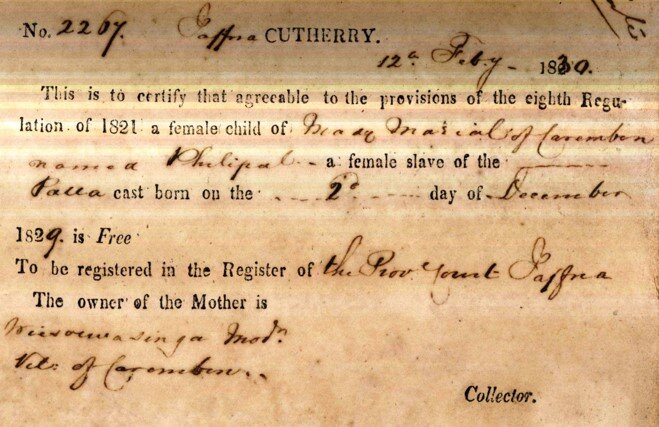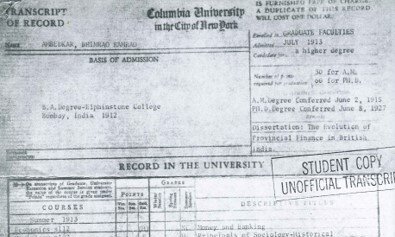In popular memory, Sri Lanka has no history of slavery. Nira Wickramasinghe's latest book, Slave in a Palanquin, challenges this using Dutch and British archival records to point to the lives of thousands of enslaved persons including men and women from across the Indonesian archipelago, local Sinhalese, Muslims, and Tamils. In the following conversation, conducted over email, Nira Wickramasinghe speaks to historians Kalyani Ramnath and Tamara Fernando.
Read MoreLiberalism could no longer claim that it was ravaging and destroying worlds based on any good. So what happens? And that's what we start looking at — late liberalism. Liberalism says, in terms of its cultural logics, does this amazing thing. What a great trick! And it's what I and my colleagues at Belyuen were in the middle of in 1984.
Read More“At the level of historical analysis, there is a long history of conflict… For “ruler” and “ruled” within Panjab, much of the literature, poetry, and aphorisms point to widespread irreverence and even contempt of common people toward authority. This resonates through Sikhi and its philosophy of empowering the most exploited and excluded to confront their oppressors. Even at a broader level, it is not merely a colonialist fantasy to acknowledge that the legitimacy of rulers in Panjab and its environs was quite precarious.”
Read MoreThe mother’s body is usually our first memory. In situations of crisis, people revert to these primal moments: we crave once more for the maternal embrace. I work on the First World War, and I am reminded of young men in the trenches who, in their final moments, would often ask for their mother. Two scenes, in particular, come to mind…
Read MoreEven though we're differently positioned disciplinarily, we're all kind of interested in—the ways that ideas and institutions are mobile, that they can be reconfigured. You can't make anything and everything with them—but they are available for recapture and repurposing. To get at this, we are also all looking at moments in which a certain form of transformation is possible or these moments of repurposing are available to certain kinds of actors.
Read More“My problem was how do we write a history of capitalism, if you call yourself a Marxist, you have all these categories before you, how do you use them to write a history of capitalism? And it always struck me as paradoxical that Marxists above all should have been writing a history of capitalism but weren't. I mean, whereas you had the Annales school and the various continental historians and so on writing histories of capitalism. Whenever a Marxist attempted to write a history of capitalism…”
Read More“I avoided the word “origins” of capitalism because this wasn't a substantial cognitive claim. It was a looser agenda, namely the rise of capitalism. I hope you see the point of a distinction between talking about the origins of something as putatively specific and the rise of something as more flexible and potentially more fertile. So that was the essay where I argued that it made no sense to transplant Marx's strictly methodological remarks in Capital about the relationship between commercial and industrial capital to a history of capitalism…”
Read MoreWe started [the Ambedkar Initiative] in 2018—about a century after B.R. Ambedkar studied at Columbia University. This is a project of critical commemoration, which thinks about the distinctive legacies of a figure who stretched ideas of democracy and equality in fundamentally new directions ... But we also want to think about how Ambedkar’s own intellectual formation might open up new ways to understand the history of the University.
Read MoreAamer Ibraheem, PhD candidate in the Department of Anthropology at Columbia University, met with Assistant Professor Zainab Saleh from Haverford College’s Department of Anthropology to discuss her new book, Return to Ruin: Iraqi Narratives of Exile and Nostalgia.
Read MoreIn this interview, Suraj Yengde speaks with Borderlines on how Dalit intellectual assertion is shaping new horizons for politics, media, and academia across the globe. He discusses Ambedkar's writings and life as a mark of the intersection between critical Dalit and Black thought; and perceptions of the term Dalit within and outside of India. He outlines what it means to build Dalit-Muslim solidarities, how to analyze Prime Minister Narendra Modi's leadership through the lens of caste, and the pressing question of political prisoners in India. The interview explores multiple projects Yengde has taken on, including his books Caste Matters and the Radical in Ambedkar (co-edited with Anand Teltumbde), and the Dalit Film Festival.
Read More“My line is quite simple here. History challenges theory, however great. History is messy whereas theory is tidy, and, for the most part, seamless. History has its work to do, and that is, fundamentally, to stand in opposition to, and in a critical location towards, theory. We must allow the ‘mess’ to come through. If I have grown ever more concerned with chaotic agency, this is the reason why.”
Read MoreAnticolonial Hauntings: The Past as Inheritance, The Present as Obligation marks the first of Borderlines’ Conversations Series, which seeks to discuss common themes from books on the study of Africa, South Asia, and the Middle East by putting authors in conversation with each other. In this conversation, we discuss Elleni Centime Zeleke’s Ethiopia in Theory: Revolution and Knowledge Production 1964-2016, Chris Moffat’s India’s Revolutionary Inheritance: Politics and the Promise of Bhagat Singh, and Sara Salem’s Anticolonial Afterlives in Egypt: The Politics of Hegemony.
Read More“Fiction, as it becomes harder to parse, offers a snag that can begin to help us understand where we need to do some reconstructive concept work. In the interstices, there is something that literary method allows us to approach, sometimes just because we have to put back together the plot, resolve the financial mystery. There's a certain way of reading for the plot here that enables us to get a sense of what was animating these moments: worry, concern, suspense, hope, desire, deceit.”
Read More“Recognizing that a form of territorialization particular to an imperial frontier such as the Inner Line and the other boundaries has persisted into our times is important for understanding the nature of postcolonial sovereignty, not in the way it is idealized by nationalists and by the United Nations way of seeing, but in its actually existing form.” Sanjib Baruah speaks with Rishav Thakur about his book In the Name of the Nation: India and its Northeast
Read More“How is it that housing functions in Egypt and how do people access housing? Unfortunately, we believe that housing in Egypt is a market like most Western markets. Whereas actually one of the main things that you find is that most people actually build their housing themselves; self built or buna’ ahaly, as it's called. And this, paradoxically, is the housing that is most demonized by the government and by planning experts and by architects as Ashwaiyat, slums, or informal housing. So this was for me, really what I was trying to find out: where is the norm and how far are we from it?”
Read More“I can think of three things that have contributed to this flowering of legal history among South Asianists in the new millennium. First, there is the simple realization that case law is a kind of storytelling…”. Uponita Mukherjee speaks with Mitra Sharafi about what it means to study the legal history of South Asia now. The discussion explores new methods and the new possibilities (and challenges) in writing socio-legal studies of South Asia.
Read MoreIn Cairo Collages, Abaza adopts the visual as method, and chooses to narrate her story through the framework of collages. “I found myself struggling with images and snapshots of particular moments that might in appearance look unrelated but that are clearly bound together,” Abaza explained. It was, ultimately, an attempt of putting together different pieces of a puzzle that might appear fragmented and contradictory but are dictated by a narrative line of urban life as experienced through the microcosm of living in an apartment building.
Read MoreMy moment of awakening came when I was monitoring the gender effects of the Arab uprisings (between 2010-2015) for a webzine called open Democracy. My evolving thoughts on the meanings and effects of citizen and youth mobilization led to a series of short articles probing into the dynamics of a new politics of gender. It was evident that a whole range of authoritarian regimes that had signally failed to meet the expectations of their citizenry were no longer able to contain their respective societies except through recourse to increased coercion…
Read MoreOn the 10th anniversary of The Caste Question, Anupama Rao speaks to Kelvin Ng about the questions that her book addressed and the debates it raised. They discuss how the book shifted the debate on caste from questions of social justice and the state to problems of personhood and Dalit subject formation; the way it drew from writing on slavery, anti-slavery and emancipation; Ambedkar’s anger at the unavailability of the Dalit subject in history; the dilemmas of competing minorities: the emergence of the Dalit subject and the unmaking of the Muslim subject in South Asia; different receptions to the book; the convergence of subaltern thought with global history; and contemporary Indian politics as a contingent and conjunctural process.
Read MoreIs caste a peculiarly South Asian problem? Joel Lee talks to N. Paul Divakar, Rita Izsák-Ndiaye, and Mohamed Nur Iftin, at the sidelines of the International Congress on Discrimination based on Work and Descent, Casteism, Antigypsism, Traditional and Contemporary Forms of Slavery and Other Analogous Forms of Discrimination about groups across the world who face enforced endogamy, and coerced occupational specialization in stigmatized forms of labour, and asks them to critically reflect on a new concept in global thought: Discrimination based on Work and Descent.
Read More


















